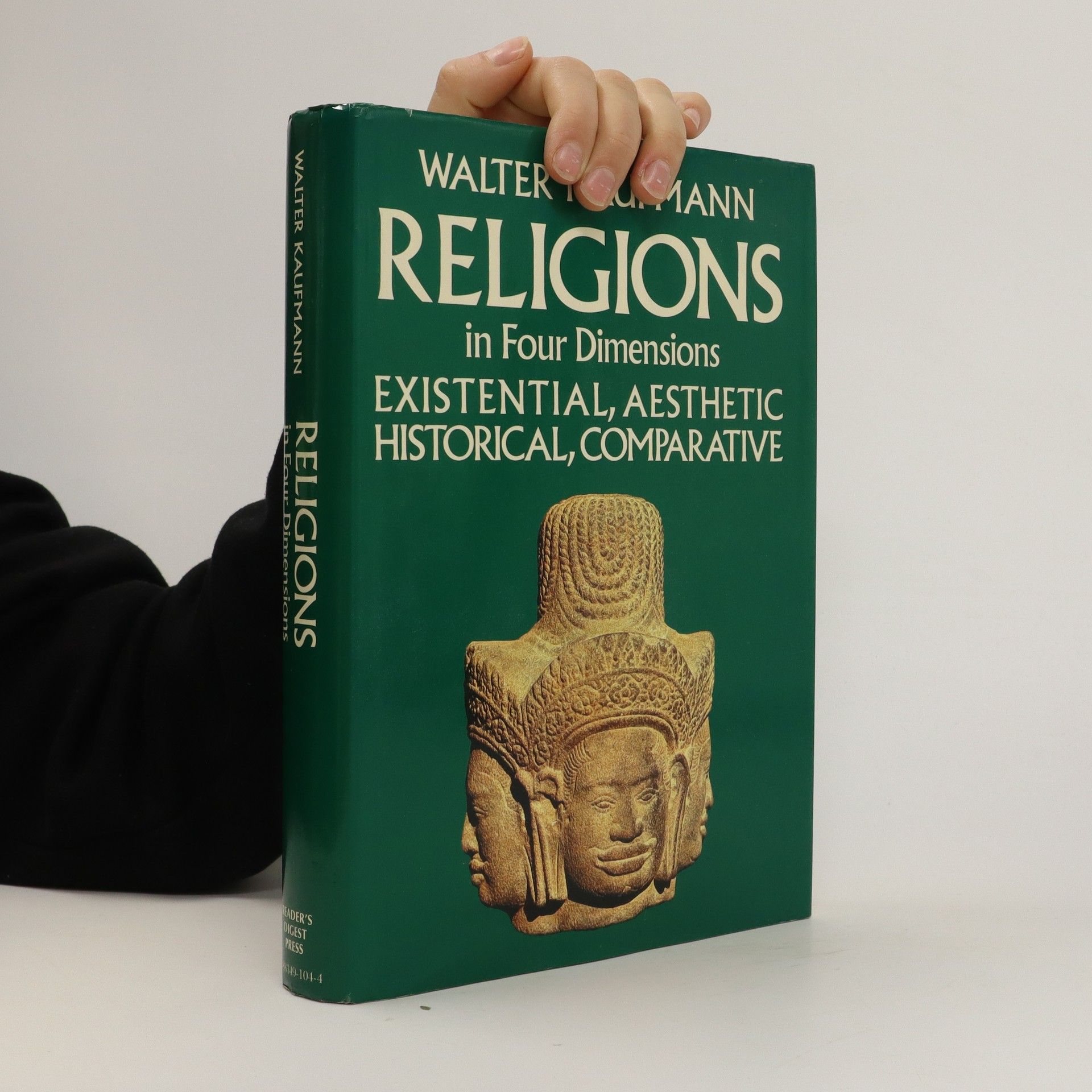Well produced, copiously illustrated scholarly tome covering all major world religions. Well over 200 illustrations including 183 in color, photos by the author. Includes a bibliography. Prologue Ancient Israel Ancient Iran The Jews since Jeremiah: exile & return The New Testament Post-Biblical Christianity Muhammad & the Koran Islam after Muhammad Ancient India Hinduism: caste, the Gita & Gandhi The third face of India Jainism, Sikhism, Buddhism From Ceylon to Japan Judaism, Christianity, Islam & the arts Hinduism, Jainism, Buddhism & the arts Epilogue: Landscape & religion Acknowledgment Note on the Translations Note on Transliteration Bibliography Index Notes on the Pictures Chronology
Walter Kaufmann-Bühler Libros
- John Mercator






The Portable Nietzsche
- 692 páginas
- 25 horas de lectura
The works of Friedrich Nietzsche have fascinated readers around the world ever since the publication of his first book more than a hundred years ago. As Walter Kaufmann, one of the world's leading authorities on Nietzsche, notes in his introduction, "Few writers in any age were so full of ideas," and few writers have been so consistently misinterpreted. The Portable Nietzsche includes Kaufmann's definitive translations of the complete and unabridged texts of Nietzsche's four major works: Twilight of the Idols, The Antichrist, Nietzsche Contra Wagner and Thus Spoke Zarathustra. In addition, Kaufmann brings together selections from his other books, notes, and letters, to give a full picture of Nietzsche's development, versatility, and inexhaustibly. "In this volume, one may very conveniently have a rich review of one of the most sensitive, passionate, and misunderstood writers in Western, or any, literature." -Newsweek
The Birth of Tragedy (1872) was Nietzsche's 1st book. Its youthful faults were exposed by him in the brilliant 'Attempt at a Self-Criticism' which he added to the new edition of 1886. But the book, whatever its excesses, remains one of the most relevant statements on tragedy ever penned. It exploded the conception of Greek culture that was prevalent down thru the Victorian era. It sounded themes developed in the 20th century by classicists, existentialists, psychoanalysts & others. The Case of Wagner (1888) was one his last books & his wittiest. In attitude & style it's diametrically opposed to The Birth of Tragedy. Both works transcend their ostensible subjects & deal with art & culture, as well as the problems of the modern age generally. Each book in itself gives us an inadequate idea of its author; together, they furnish a striking image of Nietzsche's thought. The distinguished new translations by Walter Kaufmann superbly reflect in English Nietzsche's idiom & the vitality of his style. Kaufmann has also furnished running footnote commentaries, relevant passages from Nietzsche's correspondence, a bibliography, &, for the 1st time in any edition, an extensive index to each book.
Existentialism from Dostoevsky to Sartre
- 384 páginas
- 14 horas de lectura
One of the foremost resources on existentialism from renowned philosopher, poet, and Nietzsche translator Walter Kaufmann—a must-read for philosophers, both armchair and professional. Existentialism from Dostoevsky to Sartre provides basic writings of Dostoevsky, Kierkegaard, Nietzsche, Rilke, Kafka, Ortega, Jaspers, Heidegger, Sartre, and Camus, including some not previously translated, along with an invaluable introductory essay by Walter Kaufmann.
Introduction by Peter Gay Translated and edited by Walter Kaufmann Commentary by Martin Heidegger, Albert Camus, and Gilles Deleuze One hundred years after his death, Friedrich Nietzsche remains the most influential philosopher of the modern era. Basic Writings of Nietzsche gathers the complete texts of five of Nietzsche’s most important works, from his first book to his last: The Birth of Tragedy, Beyond Good and Evil, On the Genealogy of Morals, The Case of Wagner, and Ecce Homo. Edited and translated by the great Nietzsche scholar Walter Kaufmann, this volume also features seventy-five aphorisms, selections from Nietzsche’s correspondence, and variants from drafts for Ecce Homo. It is a definitive guide to the full range of Nietzsche’s thought. Includes a Modern Library Reading Group Guide
La voluntad de poder es uno de los tópicos cardinales del pensamiento de FriedrichNietzsche, por lo mismo motivo de serios malentendidos y de una ingente cantidad depáginas. Éstas que el lector tiene entre sus manos intentan apenas el planteamiento de unatesis, a saber, que la concepción de la voluntad de poder en Nietzsche tienefundamentalmente el carácter de un postulado epistemológico (aunque no solamente) yno, por ejemplo, metafísico. Por último, intentarán ser mostrados, aunque con brevedad,al menos algunos de los puentes que comunican la tesis de la voluntad de poder con otrode los temas del filosofar nietzscheano que han tenido una enorme repercusión: el eternoretorno
Thus spoke Zarathustra : a book for all and none
- 352 páginas
- 13 horas de lectura
Friedrich Nietzsche's most accessible and influential philosophical work, misquoted, misrepresented, brilliantly original and enormously influential Nietzsche was one of the most revolutionary and subversive thinkers in Western philosophy, and Thus Spoke Zarathustra remains his most famous and influential work. It describes how the ancient Persian prophet Zarathustra descends from his solitude in the mountains to tell the world that God is dead and that the Superman, the human embodiment of divinity, is his successor. Nietzsche's utterance 'God is dead', his insistence that the meaning of life is to be found in purely human terms, and his doctrine of the Superman and the will to power were all later seized upon and unrecognisably twisted by, among others, Nazi intellectuals. With blazing intensity and poetic brilliance, Nietzsche argues that the meaning of existence is not to be found in religious pieties or meek submission to authority, but in an all-powerful life force: passionate, chaotic and free.



